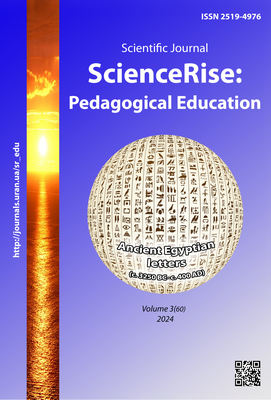Технологія організації методичного онлайн-супроводу під час фундаментальної підготовки майбутніх учителів фізики в педагогічному університеті
DOI:
https://doi.org/10.15587/2519-4984.2024.311628Ключові слова:
фундаменталізація, фундаментальна підготовка, вчитель фізики, методичний онлайн-супровід, інтеграція, технологіяАнотація
У статті обґрунтовано дидактичну доцільність технології організації методичного онлайн-супроводу під час фундаментальної підготовки майбутніх учителів фізики в педагогічному університеті. Технологію організації методичного онлайн-супроводу під час фундаментальної підготовки майбутніх учителів фізики в педагогічному університеті потрактовано як поетапний процес створення інтегрованого середовища інформаційно-освітніх ресурсів, програмно-технічних і телекомунікаційних засобів, правил їхнього адміністрування і використання, що забезпечують можливості інтерактивної взаємодії під час навчання та самостійної роботи. Визначено та схарактеризовано етапи технології організації методичного онлайн-супроводу під час фундаментальної підготовки майбутніх учителів фізики в педагогічному університеті: підготовчо-цільовий, проєктувально-мотиваційний, діяльнісно-реалізаційний та аналітико-рефлексивний етапи. Підготовчо-цільовий етап зорієнтовує викладача на постановку чіткої мети – розробити електронні ресурси (дистанційні курси/онлайн-платформи/персональний сайт викладача) для вивчення освітніх компонентів чи поглибленого їх вивчення, організації проєктної, дослідної діяльності, з’ясовує, чого він сподівається досягти за допомогою таких засобів навчання, співставляється мета і результат. Проєктувально-мотиваційний етап зумовлює проєктування способів подачі змісту електронних ресурсів, кількість сторінок, що має відображатися на сторінках та яким чином, що мотивуватиме майбутніх учителів фізики до навчання, які методи подачі навчального матеріалу краще використати з мотиваційною метою, які матеріали допоможуть студентам у методичному плані краще засвоювати навчальний матеріал. Діяльнісно-реалізаційний етап відбиває безпосередній процес створення електронних ресурсів: обрання й тестування функціоналу програмно-технічних засобів, інтеграція до онлайн-платформи (Google Sites, Google Classroom тощо) можливостей проведення відеоконференцій (Google Meet, Zoom, Skype, ресурсів Instagram тощо), використання можливостей спілкування у чатах та месенджерах. Аналітико-рефлексивний етап передбачає здійснення ґрунтовного аналізу змісту й функціоналу розроблених електронних ресурсів методичного онлайн-супроводу під час фундаментальної підготовки майбутніх учителів фізики в педагогічному університеті, а також оцінювання досягнутих студентами результатів навчання, спільна рефлексія викладача і студентів. Доведено, що створення технології організації методичного онлайн-супроводу у процесі фундаментальної підготовки майбутніх учителів фізики в педагогічному університеті є інтеграцією особистісно-орієнтованої та ресурсно-орієнтованої технології, що уможливлює під час дистанційного вивчення освітніх компонентів оволодіння студентами системою знань, набуття практичних навичок та формування інформаційної культури
Посилання
- Zavrazhna, O. M., Saltykova, A. I. (2020). Fundamental knowledge as a basis for professional training of a future physics teacher. Innovate Pedagogy, 1 (22), 121–125. https://doi.org/10.32843/2663-6085/2020/22-1.27
- Zabara, O. A. (2015). Metodyka vykonannia fizychnoho praktykumu maibutnimy uchyteliamy fizyky v umovakh vzaiemozviazku realnoho ta virtualnoho navchalnoho eksperymentu. [Extended abstract of PhD thesis,].
- Korobova, I. V. (2016). Kompetentnisno oriientovana metodychna pidhotovka maibutnikh uchyteliv fizyky na zasadakh indyvidualnoho pidkhodu. Kherson: FOP Hrin D. S., 366.
- Minaev, Y. (2023). The content modernization of physics teachers’ professional training which are connected with external independent evaluation of education quality. Pedagogical Sciences: Theory and Practice, 2, 209–213.
- Opachko, M. V. (2014). Kompleksnyi pidkhid u formuvanni metodychnoi maisternosti vchytelia fizyky. Naukovyi visnyk UzhNU. Seriia «Sotsialna robota. Pedahohika», 30, 114–117.
- Karapuzova, I. V. (2010). Orhanizatsiia pedahohichnoi pidtrymky maibutnikh uchyteliv u protsesi navchannia. [Extended abstract of PhD thesis].
- Hurzhii, A. M. (2020). Rozroblennia ta vykorystannia merezhevykh navchalno-metodychnykh kompleksiv dlia pidhotovky kvalifikovanykh robitnykiv. Zhytomyr: Polissia, 214.
- Kononets, N., Ilchenko, O., Zhamardiy, V., Shkola, O., Broslavska, H., Kolhan, O. et al. (2021). Software tools for creating electronic educational resources in the resource-based learning process. Journal for Educators, Teachers and Trainers, 12 (3), 165–175.
- Soloshych, I., Grynova, M., Kononets, N., Shvedchykova, I., Bunetska, I. (2021). Competence and Resource-Oriented Approaches to the Development of Digital Educational Resources. 2021 IEEE International Conference on Modern Electrical and Energy Systems (MEES), 2, 1–5. https://doi.org/10.1109/mees52427.2021.9598603
- Shunevych, B. (2008). Rozvytok dystantsiinoho navchannia u vyshchii shkoli krain Yevropy ta Pivnichnoi Ameryky. [Doctoral dissertation].
- Parnenko, V. S. (2013). Web design as the foundation of the modern virtual environment. Pratsi Odeskoho politekhnichnoho universytetu, 2, 247–251.
- Zhykharieva, V. V., Baryshnikova, V. V., Petrova, A. V. (2020). Suchasni problemy dystantsiinoi osvity u vyshchii shkoli. Dystantsiina osvita v Ukraini: innovatsiini, normatyvno-pravovi, pedahohichni aspekty. Kyiv: NAU, 38–40.
- Antoniuk, O., Savchuk, S., Shostak, I. (2024). Content-technological aspects of the organization of distance education in institutions of higher education in the conditions of the state of martial. Youth and market, 6 (226), 37–41. https://doi.org/10.24919/2308-4634.2024.307817
- Motsar, M. M. (2015). Pedahohichna pidtrymka tvorchoho rozvytku maibutnikh perekladachiv pry navchanni dystantsiinym formam zainiatosti z vykorystanniam tekhnolohii dystantsiinoho navchannia. Naukovyi chasopys Natsionalnoho pedahohichnoho universytetu imeni M.P. Drahomanova. Seriia 16. Tvorcha osobystist uchytelia: problemy teorii i praktyky, 25 (35), 100–104.
- Opachko, M. V. (2014). Kompleksnyi pidkhid u formuvanni metodychnoi maisternosti vchytelia fizyky. Naukovyi visnyk UzhNU. Seriia «Sotsialna robota. Pedahohika», 30, 114–117.
##submission.downloads##
Опубліковано
Як цитувати
Номер
Розділ
Ліцензія
Авторське право (c) 2024 Roman Grynyov

Ця робота ліцензується відповідно до Creative Commons Attribution 4.0 International License.
Наше видання використовує положення про авторські права Creative Commons CC BY для журналів відкритого доступу.
Автори, які публікуються у цьому журналі, погоджуються з наступними умовами:
1. Автори залишають за собою право на авторство своєї роботи та передають журналу право першої публікації цієї роботи на умовах ліцензії Creative Commons CC BY, котра дозволяє іншим особам вільно розповсюджувати опубліковану роботу з обов'язковим посиланням на авторів оригінальної роботи та першу публікацію роботи у цьому журналі.
2. Автори мають право укладати самостійні додаткові угоди щодо неексклюзивного розповсюдження роботи у тому вигляді, в якому вона була опублікована цим журналом (наприклад, розміщувати роботу в електронному сховищі установи або публікувати у складі монографії), за умови збереження посилання на першу публікацію роботи у цьому журналі.









